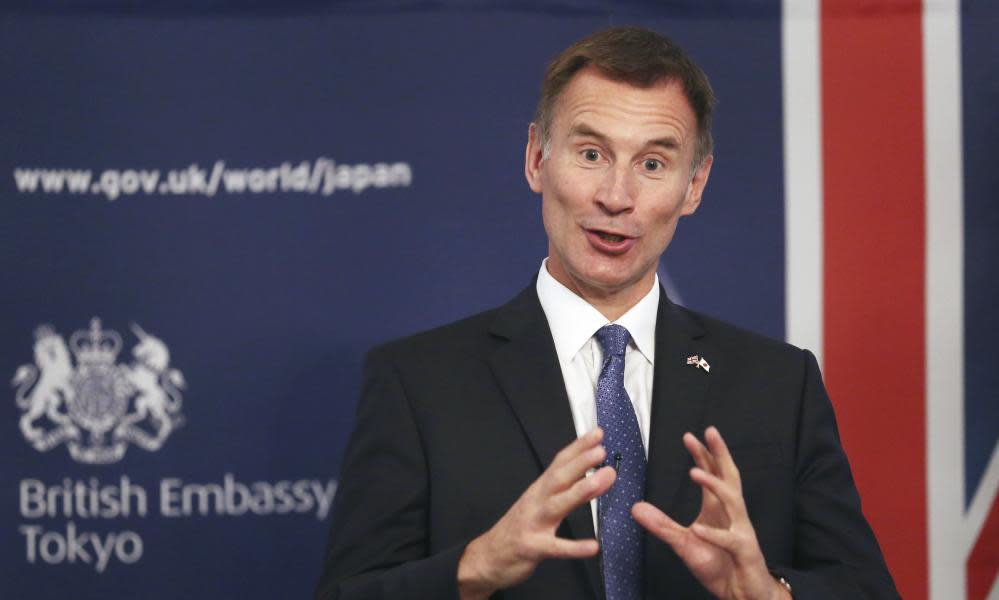Learn another European language – and give two fingers to Brexit Britain

For someone who occasionally seems unsure whether their wife is Japanese or Chinese, Jeremy Hunt seems to speak pretty good Japanese.
Unless bits of it were Chinese, obviously. Given the way things have gone lately for Theresa May’s government we probably shouldn’t rule anything out, but let’s just assume the Tokyo audience he addressed in their native tongue this week wasn’t just being polite and that he did actually deliver the whole speech in the correct language.
Whatever you think of Hunt’s politics generally, there was something endearing about the sight of a foreign secretary actually trying to speak some foreign, at a time when much of Britain seems belligerently convinced that if the world doesn’t understand us then we should just shout louder at them. Foreign languages have been in decline in British schools for years, especially at A-level; German in particular is so unpopular now, with a 45% drop in entries since 2010, that some schools will be seriously debating dropping it from the timetable. Languages have become seen as subjects in which it’s too hard to excel, partly because native speakers tend to scoop the A* awards and push the bar higher for everyone else, which makes them too much of a risk for kids intent on getting the grades for university.
Lately there has been some tinkering with grade boundaries to encourage uptake. But while mathematicians and scientists have gone to great lengths to popularise subjects once seen as geeky or intimidatingly difficult, there has been no concerted push behind French or Spanish.
And if we’re honest, Britain’s solid international reputation for being rubbish at languages isn’t just down to the kids. How many of us slogged through years of irregular verbs and asking the way to the station, only to be reduced in middle age to fumbled holiday conversations in shops and frantic pointing?
But watching Hunt reminded me of something I’ve been wondering for a while, which is whether the prospect of leaving Europe will finally make learning a language feel less like a slog and more like a thrillingly subversive act; one great defiant two fingers to everything Brexit Britain stands for.
Languages are lovely things to learn in their own right, of course, if you’re so minded; living, breathing entities that weave in and out of each other, exchanging sounds and words and ideas. But they’re also one of the purest forms of soft power. Speaking to someone in their own tongue is a disarming act, a gesture of empathy and respect. If you’re not actually very good at it then in some ways all the better; at least it’s obvious you’re making an effort, which is why typing furiously into Google Translate doesn’t quite have the same effect.
Eventually, once they’re good enough to stop occasionally churning out scrambled garbage, robot translators will presumably put human translators out of business. But they’ll still struggle to convey what a human switching between languages does, which is a fundamental willingness to put oneself out in order to put someone else at ease. Speaking foreign languages is about meeting people halfway, building bridges and accepting differences – all skills sorely in need of some practice, judging by the current tone of public conversation.
But above all, languages open so many doors to understanding. There are few better ways of grasping why so many British negotiating gambits flop in Brussels than reading a German newspaper’s take on them. (I still have fond memories of sneaking into French government briefings at EU summits, the gist of which was usually that the French had conclusively won all the arguments, to compare them with the Downing Street version in which oddly enough it was generally the British who had triumphed.)
And even to understand the construction of a language can shed light on a different way of thinking. What seems like basic politeness in English sounds almost weirdly apologetic if translated directly into anything from Spanish to Hebrew, while people translating directly the other way can sound rude, abrupt or stilted to English ears even when that’s not remotely the intention. A basic knowledge of how someone’s first language works goes a long way to avoiding small, grating cultural misunderstandings when they’re using their second.
It’s true that English remains the lingua franca of big tourist resorts and business conferences. But the trouble with grandly relying on everyone else to speak your language is that it can make you oddly vulnerable. What stubborn monoglots often don’t realise is that they will only ever hear as much as the people around them want them to hear; that private conversations and whispered asides will remain a closed book. If you really want to take back control, then learn a language, and with it the small covert thrill of eavesdropping on conversations that people don’t realise you can understand.
But it’s Brexit that could turn an abstract intellectual pleasure into a small private act of defiance, both for grieving remainers and for those liberal leavers who actually meant what they said about leaving the EU but not leaving Europe. For those who can’t bear to see Britain defined by belligerent isolationism, who don’t want the rest of the world to think that this is who we are, then one tiny but practical way of showing it is brushing up on a European language and making a determined effort to use it. Cold comfort, obviously, for those who would rather Britain never left at all. But if the great rupture is coming, then we still have a choice over how culturally isolated we become. The least we can do is keep talking.
• Gaby Hinsliff is a Guardian columnist

 Yahoo News
Yahoo News 
